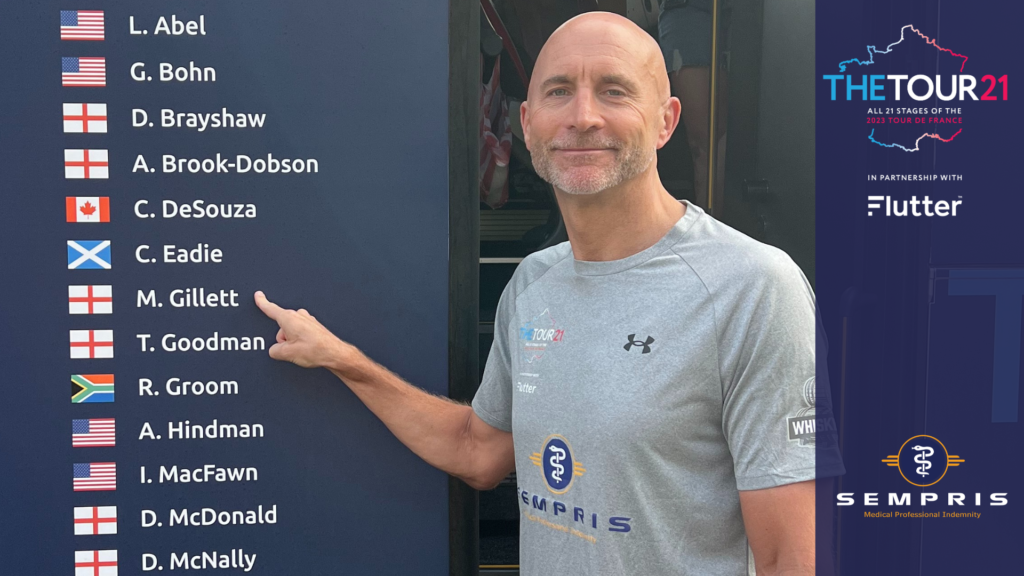SEMPRIS member Dr Mark Gillett wears a number of hats – as well as being a consultant in sport and exercise medicine at clinics in London and the Midlands, he is also the Chief Medical Officer for the Premier League and Lead Physician for TASS (Talented Athlete Scholarship Scheme). This weekend he is going to be attempting a gruelling challenge – he will be cycling all 21 stages of the 2023 Tour de France, starting in Bilbao on June 24th & finishing in Paris on July 16th. This is the same schedule as the pros, a week ahead of the main event. It is a massive challenge and the culmination of a structured nine-month training programme, which he has obviously had to accommodate around his professional and family commitments.

He’ll be part of a 20-man team tasked with raising £1 million for Cure Leukaemia, which helps to fund the national Trials Acceleration Programme (TAP). With 15 specialist research nurses in 15 cities, this network enables pioneering blood cancer clinical trials to connect patients with potentially life-saving treatments not currently available through standard care.
Before he headed off to prepare for the first stage, we took the opportunity to speak with Mark about his motivations for taking part, what his expectations and goals are, and any lessons he’s learned in the lead up to the event.
Firstly, we asked him how he came to select this particular fundraising challenge and charity. He replied “I’ve been looking for a challenge for a number of years, one which I felt I could commit to and that was tough enough to make me fearful about whether or not I had it in me to finish it. I met some people who’ve done it before, so I knew how big a challenge it actually is.”
Mark then met representatives of Care Leukaemia, who are the official British charity partner of the Tour de France. He was inspired by them and the work they do, so he knew it was a very much a cause he could get behind.
Mark has only been cycling for two about years, and he’s gone from being a novice to attempting the biggest challenge in cycling there is. So we asked him how this came about. “I’ve been through the whole spectrum of activities”, he laughed. “I started off as a swimmer in my youth, then started running. But as you get older it becomes a little bit more difficult to run as much as you’d like – and then cycling really comes into its own! It’s great exercise, and you can recover quicker than from a tough run, so you can do it more often.”
So what has he been doing to prepare?
He said, “The first thing I did when I was selected was to get a coach, who then set my schedules for nine months leading up to the challenge. I’ve tried to adhere to two strength sessions a week until relatively recently. The other consideration when doing something like this is to recover properly, so I’ve been mindful of what I eat and drink, and watch what I do socially.”
As Mark mentioned that he wanted to do something with an element of fear to it, we asked him how he prepared mentally.
“I think we’re going to find out if I make it through the next month unscathed, whether or not I’ve had an advantage from being around elite sports people for most of my career!” He laughed. “I’ve supported Olympic teams, Premier League football teams, Commonwealth Games teams, so I’ve seen I’ve seen how they manage pressure, and participated in developing the strategies to help them manage that type of stress. So now’s the time to see if I can practice what I preach!”
We asked Mark if there was anything in particular he’s taken away from that experience which has been especially useful for this challenge.
“I think ‘stay in the moment’ is the key mantra in sport”, he replied. “Don’t get too low after a bad day; don’t get too high after a good day and keep looking forwards, don’t look back’.
And what goals has Mark has set for himself?
“One is to raise £30k for the charity, that’s really important and of course the fundraising is everyone’s main driver. The next for me is to actually complete the race! And then thirdly, it’s to finish as well as I can – I’ll start to find out how well that will be as I progress through the stages.
We were interested to discover what he has learned in the process so far that has surprised him?
He considered for a moment and then said: “The training programme is pretty didactic, and quite monotonous. Sometimes, at its peak, it’s around 25 hours a week. And certainly, when you’re doing two indoor sessions a day, there’s an element of cumulative fatigue. You forget how emotionally flat that can feel, for long periods of time, because of the drain on energy. For example, if you’re finishing a session at 8pm at night, and you know your next one is at 6am in the morning, it can be really hard to regain that enthusiasm when you get out of bed in the morning. At times during the Winter, that aspect was particularly challenging!”
As somebody that specialises in looking after sports people’s bodies and their physiological wellbeing, we wondered how good he was at actually doing that for himself?
“I think I’m alright at that, in terms of getting enough sleep, recovering properly – I’m well aware of the need to do that,” he responded. “I think it’s more difficult for the people around you – the training is very antisocial, and it gets in the way of normal life. The support and commitment it requires from everybody around you is sometimes what people forget.”
So how does he manage that scenario?
“I think that it’s going to cost me a lot of money to make it up to my family!” Mark laughed. “Seriously though, it’s me that’s got to do the work. People get very idealistic and perhaps lose a bit of reality around this type of challenge. If you boil it down to its simplest form, while it’s me having to do the work and having to do all the training sessions, it’s important to realise the impact on the people around you, and manage that as best you can – which is sometimes even more of a challenge than what you’re doing!
“I was lucky in that I competed at a reasonably high level as a swimmer when I was younger, and I knew it was something I wanted to try one more time. I know personally how it affects your life and takes over things, however my family have been protected from that as it’s not something they knew me for. But the years pass, and you forget how monotonous it is, and the resilience and diligence that’s required.”
We asked Mark if he had any top tips to pass on. “Get some good advice,” he urged. “The biggest mistake I see professionally with patients getting injured or not performing, is a lack of variety in their training sessions. They tend to do the same sessions day after day with very little rest, little strength work, little stretching and not utilising different energy systems. Getting lots of variety in your workouts is really important.”
“It’s quite daunting to raise that amount of money,” he continued. “So I spoke to the people who I’ve had a good, trust-based business relationship with first. I’ve known SEMPRIS for a number of years, and they’ve been very supportive of football medicine. I’m incredibly grateful to them for supporting me in this challenge.”
As we neared the end of our conversation, we asked Mark what he felt was most daunting about the challenge, and what he was most looking forward to. “There’s a couple of stages two thirds through which look incredibly daunting,” he responded. “People who have cycled the Tour de France have already messaged me to tell me they are really difficult stages. But we have a Premier League tournament in the US immediately afterwards, so we fly four days after the tour finishes, and I’m very much looking forward to getting on that plane and making sure we’ve got a bottle of champagne at the ready!
“I’ve benefited from the fact that I’ve spent 25 years in elite sport and I’m privileged to have mixed with the best people, coaches and practitioners. So I’ve come into this with my eyes open. A challenge like the one I’m doing can seem very daunting, but if you break it down and get some good advice, it becomes a lot more manageable. That’s something I hope I can help other people with in the future. Whether it’s a Marathon, Iron Man or the Tour de France stages, I believe that the key is building towards something, doing it consistently over a period of time and following a really measured programme to get where you need to be. Going forwards, I’m hoping that I’ll be in a good position to help support people that haven’t had the benefit of access to the advice that I have had.”
#TheTour21 #SEMPRISinspirations
If you’d like to support Mark in his endeavour, here is his Just Giving Page.
We’ll be following him through his stages, so check back soon for updates!
About SEMPRIS
SEMPRIS was launched in 2010 in response to requests from doctors for an indemnity scheme that provided comprehensive protection against the unique third-party risks involved in the treatment of professional sportspeople. To our knowledge, these risks are still not covered by any other Medical Defence Organisation or Insurance Scheme.
In addition, SEMPRIS covers all aspects of independent private practice, including all non-sport related practice and professional issues not covered by the NHS.
Members benefit from the expert legal support and representation offered by SEMPRIS Support. In addition to providing legal advice on all issues arising from professional practice, the service is the primary point of contact for discussing or notifying us of a ‘circumstance’ or claim against you.
The service provides full and accessible risk management, offering advice, education and updates to members on best practice and mitigating risk within private practice.
More ArticlesShare this post:
- - -
